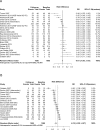Tracing the temporal stability of autism spectrum diagnosis and severity as measured by the Autism Diagnostic Observation Schedule: A systematic review and meta-analysis
- PMID: 28934215
- PMCID: PMC5608197
- DOI: 10.1371/journal.pone.0183160
Tracing the temporal stability of autism spectrum diagnosis and severity as measured by the Autism Diagnostic Observation Schedule: A systematic review and meta-analysis
Abstract
Background: Exploring ways to improve the trajectory and symptoms of autism spectrum disorder is prevalent in research, but less is known about the natural prognosis of autism spectrum disorder and course of symptoms. The objective of this study was to examine the temporal stability of autism spectrum disorder and autism diagnosis, and the longitudinal trajectories of autism core symptom severity. We furthermore sought to identify possible predictors for change.
Methods: We searched PubMed, PsycInfo, EMBASE, Web of Science, Cochrane Library up to October 2015 for prospective cohort studies addressing the autism spectrum disorder/autism diagnostic stability, and prospective studies of intervention effects. We included people of all ages with autism spectrum disorder/autism or at risk of having autism spectrum disorder, who were diagnosed and followed up for at least 12 months using the Autism Diagnostic Observation Schedule (ADOS). Both continuous ADOS scores and dichotomous diagnostic categories were pooled in random-effects meta-analysis and meta-regression.
Results: Of 1443 abstracts screened, 44 were eligible of which 40 studies contained appropriate data for meta-analysis. A total of 5771 participants from 7 months of age to 16.5 years were included. Our analyses showed no change in ADOS scores across time as measured by Calibrated Severity Scores (mean difference [MD] = 0.05, 95% CI -0.26 to 0.36). We observed a minor but statistically significant change in ADOS total raw scores (MD = -1.51, 95% CI -2.70 to -0.32). There was no improvement in restricted and repetitive behaviours (standardised MD [SMD] = -0.04, 95% CI -0.19 to 0.11), but a minor improvement in social affect over time (SMD = -0.31, 95% CI -0.50 to -0.12). No changes were observed for meeting the autism spectrum disorder criteria over time (risk difference [RD] = -0.01, 95% CI -0.03 to 0.01), but a significant change for meeting autism criteria over time (RD = -0.18, 95% CI -0.29 to -0.07). On average, there was a high heterogeneity between studies (I2 range: 65.3% to 93.1%).
Discussion: While 18% of participants shifted from autism to autism spectrum disorder diagnosis, the overall autism spectrum disorder prevalence was unchanged. Overall autism core symptoms were remarkably stable over time across childhood indicating that intervention studies should focus on other areas, such as quality of life and adaptive functioning. However, due to high heterogeneity between studies and a number of limitations in the studies, the results need to be interpreted with caution.
Conflict of interest statement
Figures





References
-
- Baxter AJ, Brugha TS, Erskine HE, Scheurer RW, Vos T, Scott JG. The epidemiology and global burden of autism spectrum disorders. Psychol Med. 2015 Feb;45(3):601–13. doi: 10.1017/S003329171400172X. Epub 2014. August 11 - DOI - PubMed
-
- Buescher AV, Cidav Z, Knapp M, Mandell DS. Costs of autism spectrum disorders in the United Kingdom and the United States. JAMA Pediatr. 2014. August;168(8):721–8. doi: 10.1001/jamapediatrics.2014.210 - DOI - PubMed
-
- Steinhausen HC, Mohr Jensen C, Lauritsen MB. A systematic review and meta-analysis of the long-term overall outcome of autism spectrum disorders in adolescence and adulthood. Acta Psychiatr Scand. 2016. June;133(6):445–52. doi: 10.1111/acps.12559. Epub 2016 Jan 13. - DOI - PubMed
-
- McPheeters ML, Weitlauf A, Vehorn A, Taylor C, Sathe NA, Krishnaswami S, et al. Screening for Autism Spectrum Disorder in Young Children: A Systematic Evidence Review for the U.S. Preventive Services Task Force. Evidence Synthesis no 129 AHRQ Publication No. 13-05185-EF-1. Rockville, MD: Agency for Healthcare Research and Quality; 2016. - PubMed
-
- Woolfenden S, Sarkozy V, Ridley G, Williams K. A systematic review of the diagnostic stability of autism spectrum disorder. Res Autism Spectr Disord. 2012. Jan-Mar;6(1):345–354.
Publication types
MeSH terms
LinkOut - more resources
Full Text Sources
Other Literature Sources
Medical
Miscellaneous

